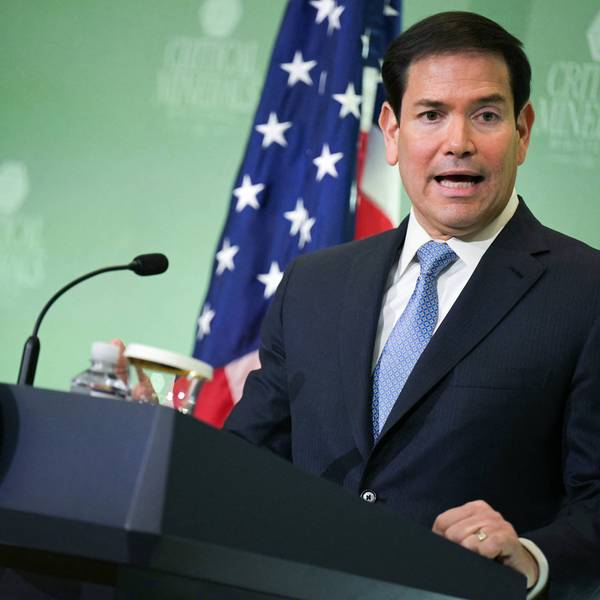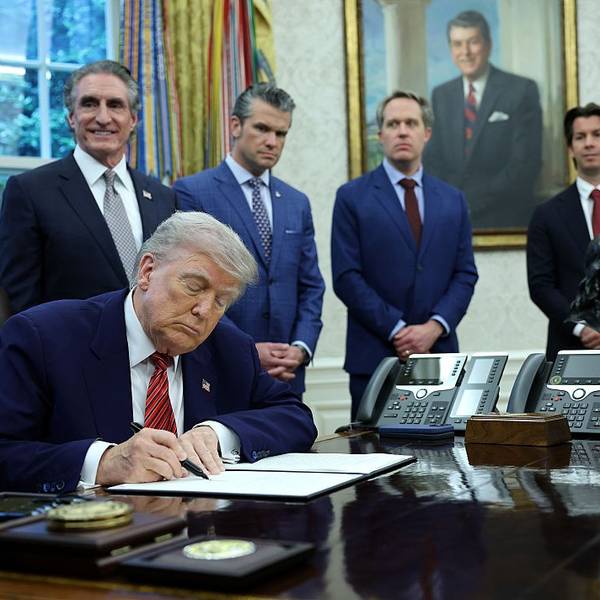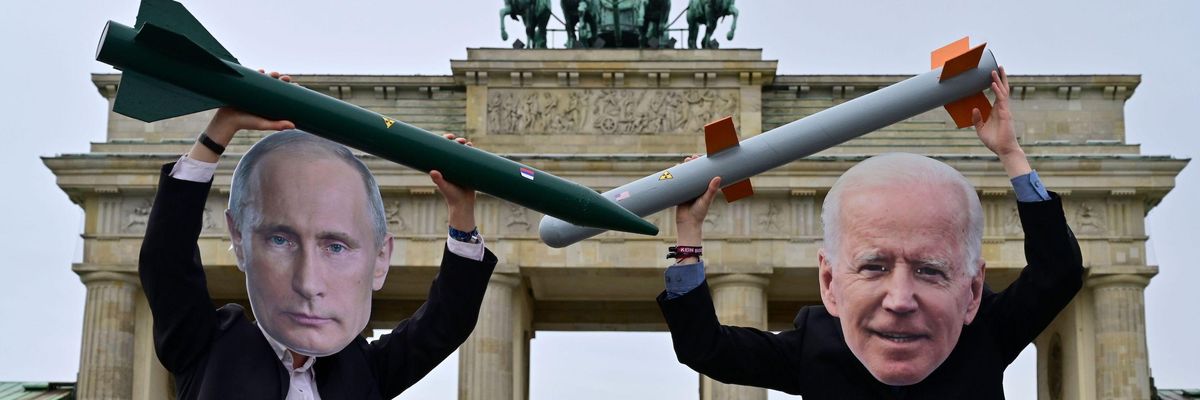A U.S.-based arms control group on Thursday forcefully countered a new bipartisan congressional report that claims it is necessary "to rebuild the nuclear infrastructure and modernize the nuclear forces" in the United States due to "the militarily troubling and increasingly aggressive behaviors of Russia and China."
While nine nations have nukes, "the three states with the largest nuclear arsenals—Russia, the United States, and China—are on the precipice of a unconstrained era of dangerous nuclear competition," the Arms Control Association (ACA) declared in response to the Congressional Commission on the Strategic Posture of the United States report.
The commission's publication comes as the Chinese government is ramping up its nuclear arsenal, amid heightened fears of a potential U.S.-China military conflict over Taiwan, and 20 months into Russia's full-scale invasion of Ukraine, which has elevated global concerns about Moscow's possible use of nuclear weapons.
"The experience of the Cold War teaches us that an unconstrained arms race has no winners, only losers."
Additionally, as the ACA noted, "with the impending expiration of the New Strategic Arms Reduction Treaty (New START) in February 2026, and the disappearance of the 1972 Anti-Ballistic Missile (ABM) Treaty and the 1987 Intermediate Nuclear Forces Treaty, Russia is now considering 'de-ratifying' the 1996 Comprehensive Nuclear Test Ban Treaty."
Given those conditions, the commission contended that the existing U.S. nuclear modernization plan should be "fully and urgently" executed but also "supplemented to ensure U.S. nuclear strategy remains effective in a two-nuclear-peer environment." Its recommended modifications include addressing "the larger number of targets due to the growing Chinese nuclear threat" and accounting for "advances in Russian and Chinese integrated air and missile defenses."
The ACA, meanwhile, stressed that "the experience of the Cold War teaches us that an unconstrained arms race has no winners, only losers. Leaders in Moscow, Beijing, and Washington need to seize the opportunity to engage in nuclear risk reduction talks, negotiate sensible and verifiable reductions of their arsenals, and refrain from building new destabilizing types of weapons, rather than proceed down a 'lose-lose' path of nuclear competition."
The group argued that "despite reckless behavior on the part of Russia and China in pursuing a more diverse array of nuclear weapons, the scale and diversity of the current U.S. nuclear arsenal still exceeds what is necessary to hold a sufficient number of adversary targets at risk so as to deter enemy nuclear attack."
"In the current context, any decision to increase the number of deployed U.S. strategic nuclear weapons above New START levels could trigger a dangerous action-reaction cycle," warned the ACA. "It would not enhance deterrence in the face of China's growing nuclear capabilities or Russia's existing capabilities. It would more likely encourage China to deploy more nuclear weapons on an even wider array of delivery systems over the coming decade and prompt Russia to match any increases in the U.S. strategic force."
"Increasing the number of deployed U.S. strategic nuclear weapons or adding new types of nuclear war-fighting weapons to the the arsenal would not only be counterproductive, but prohibitively expensive," the ACA continued. The group also emphasized that "once nuclear weapons are used in a war between the United States and Russia or between the United States and China, there is no guarantee a nuclear war could be 'limited,'" citing estimates that a major exchange could kill and injure over 90 million people in the first few hours alone.
According to the ACA:
Rather than take actions that might accelerate dangerous nuclear competition, the United States must exercise prudent nuclear restraint and energetically pursue effective arms control and disarmament diplomacy with Russia, China, and other nuclear-armed states inside and outside of the Nuclear Nonproliferation Treaty.
Considering that new bilateral nuclear arms control limits with Russia may be difficult to achieve so long as Russia's war on Ukraine rages on, the United States could seek an executive agreement or simply a reciprocal unilateral arrangement verified with national technical means of intelligence that commits Russia and the United States to respect New START's central limits until a more permanent and comprehensive nuclear arms control arrangement is concluded.
At the same time, U.S. and other world leaders should urge China, France, and the United Kingdom to cap the size of their nuclear arsenals as long as Russia and the United States meet their fundamental Nuclear Nonproliferation Treaty obligations, which involve participating in genuine negotiations to halt and reverse a potential nuclear arms race.
The group highlighted recent remarks from key members of U.S. President Joe Biden's administration to bolster its arguments for restraint and diplomacy. For example, Secretary of Defense Lloyd Austin said in December: "Nuclear deterrence isn't just a numbers game. In fact, that sort of thinking can spur a dangerous arms race."
Jake Sullivan, Biden's national security adviser, said in June speech for ACA's annual forum that "the United States is ready to engage Russia now to manage nuclear risks and develop a post-2026 arms control framework," and "we're also ready to engage China without preconditions—helping ensure that competition is managed, and that competition does not veer into conflict."
"I want to be clear here—the United States does not need to increase our nuclear forces to outnumber the combined total of our competitors in order to successfully deter them," Sullivan added in June, as a trio of experts noted last week in Foreign Affairs. One of them reshared the piece on social media Thursday in response to the congressional commission's report.
James M. Acton, co-director of the Carnegie Endowment for International Peace Nuclear Policy Program, Steve Fetter, a University of Maryland professor and King's College London visiting professor, and Charles L.Glaser, a Massachusetts Institute of Technology senior fellow and George Washington University professor emeritus, wrote that "a world in which the United States faces two nuclear peers may bring new risks. The possibility of simultaneous crises with both Beijing and Moscow could create new opportunities for misunderstanding and undesired escalation."
"The important point is that the key approach for reducing these dangers will be diplomacy, including communication in times of both peace and crisis," they added. "Expanding the U.S. nuclear arsenal would not ameliorate the nuclear threats posed by Russia and China—and might even exacerbate them."
While rising fears of such arms have fueled recent demands for every country on Earth to support the Treaty on the Prohibition of Nuclear Weapons, so far none of the nine nations with nukes—including India, Israel, North Korea, and Pakistan—have joined the global pact.




